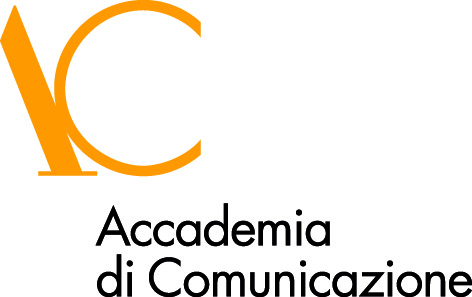Free sponsorships
VERSIONE SINTETICA IN ITALIANO
The Technical committee UNI TC 533 with the hosting support of the AIopenmind.it association, has started this work, also agreed with UNINFO , with the aim of sharing information useful for the implementation of AI Act, elicitation of terms from syntactic and semantic point of view, allowing integration with other documents such as Data Act and Data Governance Act.
407 Mapped Terms connected with:
– AI Act: 180 Whereas, 113 Articles, 13 Annexes
– 85 Standards (work in progress)
– Data Act: 119 Whereas, 50 Articles
– Data Governance Act: 63 Whereas, 38 Articles
9 February 2025
- 1) Mapping & Terminology – Global vision of AI Act (Article, Whereas, Annexes), Standards, Data Act and Data Governance Act (pdf)
- 2) Terms and articles (pdf)
- 3) Articles and terms/standards (pdf)
- 4) Standards and terms/articles (pdf)
- 5) Articles and sub-articles connections (pdf)
- 6) Whereas and relation with other EU norms (pdf)
- 7) Annexes and relation with other EU norms (pdf)
Terms present in multiple sources:
- 8a) Terms present in Data Act and AI Act (pdf)
- 8b) Terms present in Data Act and Standard (pdf)
- 9a) Terms present in Data Governance Act and AI Act (pdf)
- 9b) Terms present in Data Governance Act and Standard (pdf)
- 10a) Terms present in (Data Act, Data Governance Act) and AI Act (pdf)
- 10b) Terms present in (Data Act, Data Governance Act) and Standard (pdf)
- Historical series previous update
- 8 December 2024, 7 December 2024, 5 December 2024, 3 December 2024, 22 November 2024, 5 November 2024, 27 October 2024, 23 October 2024, 20 October 2024, 13 October 2024, 09 October 2024 , 03 October 2024, 27 September 2024, 26 September 2024, 16 September 2024, 12 September 2024, 10 September 2024, 31 August 2024, 28 August 2024, 26 August 2024, 25 August 2024, 19 August 2024, 09 August 2024, 07 August 2024, 06 August 2024, 05 August 2024, 04 August 2024, 31 July 2024, 28 July 2024, 24 July 2024, 22 July 2024
—– SUMMARY of TERMS and STANDARDS —–
The data, as presented, have a research value and not an exclusively legal value.
______________________________
The standards listed in the ongoing work can be considered complementary and voluntary, in some cases also with the possibility of conformity assessment by accredited third parties, and aim to facilitate the development of harmonized standards (Art. 40) and to determine their priority where appropriate.
STANDARD ESISTENTI ISO/IEC CONNESSI CON ARTICOLI DELL’AI ACT:
- 25012:2008 Data quality model (art.10, 17);
- 25024:2015 Measurement of data quality (art. 10, 17);
- 29119.11:2020 Guidelines on the testing of AI-based systems (Art. 9,10, 53,1(a), 60,3);
- 38507:2022 Governance implications of the use of Al by organizations (Art.10);
- TR 24368:2022 Overview of ethical and societal concerns (art.60,3);
- 22989:2022 Terminology (art.3);
- 25059:2023 Quality model for AI Systems (art.15,17);
- TS 25058:2024 Guidance for quality evaluation of AI systems (art. 3,79);
- 5259-2:2024 Data quality measures (art.10, art.17);
- 23894:2024 Guidance on risk management (art.9);
- 42001:2024 Management system (art.17);
- 5339:2024 Guidance for AI application; 24030:2024 Use cases (art.7.1);
STANDARD CEN CENELEC CONNESSI CON ARTICOLI DELL’AI ACT E STANDARDIZATION REQUEST:
- CEN CENELEC TR 18115:2024 Data Governance and quality for AI within the European context (art.10).
- CEN CENELEC TR 17894:2024 AI Conformity Assessment (art. 6.1(b)).
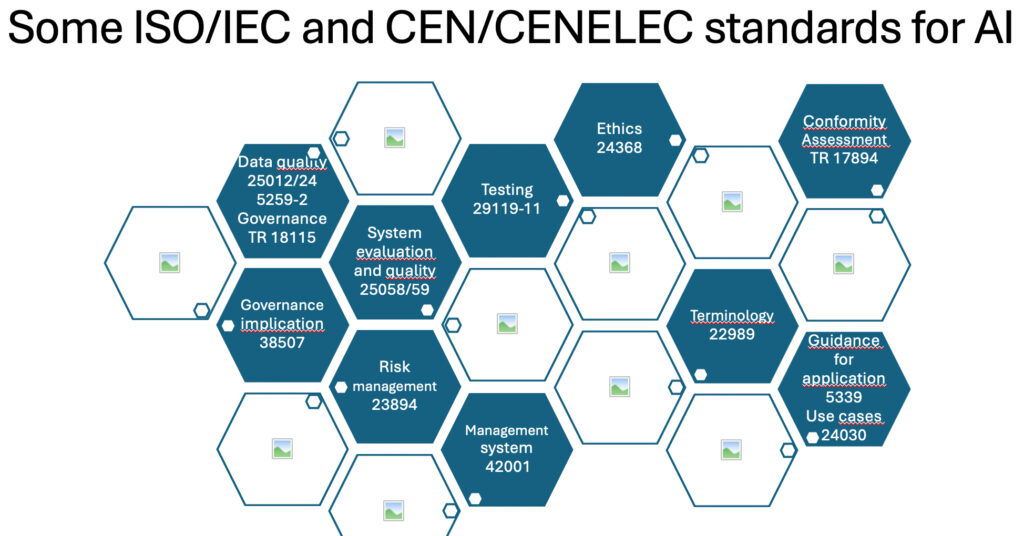
___________ link __________
Legislative norms
- Regulation (EU) 2024/1689 of the European Parliament and of the Council of 13 June 2024 laying down harmonised rules on artificial intelligence and amending Regulations (EC) No 300/2008, (EU) No 167/2013, (EU) No 168/2013, (EU) 2018/858, (EU) 2018/1139 and (EU) 2019/2144 and Directives 2014/90/EU, (EU) 2016/797 and (EU) 2020/1828 (Artificial Intelligence Act).
– AI Act (Whereas, Articles, Annexes)
a) Articles (doc)
b) Article 3 – Definitions (doc)
c) Whereas (doc)
d) Annex (doc) - First Draft of the General-Purpose AI Code of Practice published, written by independent experts
– Downloads - Regulation (EU) 2023/2854 of the European Parliament and of the Council of 13 December 2023 on harmonised rules on fair access to and use of data and amending Regulation (EU) 2017/2394 and Directive (EU) 2020/1828 (Data Act) (Text with EEA relevance).
– Data Act - Regulation (EU) 2022/868 of the European Parliament and of the Council of 30 May 2022 on European data governance and amending Regulation (EU) 2018/1724 (Data Governance Act) (Text with EEA relevance).
– Data Governance Act - Eur-Lex
– European strategy for data (EU, 2020).
– Open data Directive (EU, 2019/1024). - Commission Implementing Regulation (EU) 2024/2690 of 17 October 2024 laying down rules for the application of Directive (EU) 2022/2555 as regards technical and methodological requirements of cybersecurity risk-management measures and further specification of the cases in which an incident is considered to be significant with regard to DNS service providers, TLD name registries, cloud computing service providers, data centre service providers, content delivery network providers, managed service providers, managed security service providers, providers of online market places, of online search engines and of social networking services platforms, and trust service providers
– Regolamento di esecuzione (ue) 2024/2690 della Commissione (17 October 2024) - Directive (EU) 2022/2555 of the European Parliament and of the Council of 14 December 2022 on measures for a high common level of cybersecurity across the Union, amending Regulation (EU) No 910/2014 and Directive (EU) 2018/1972, and repealing Directive (EU) 2016/1148 (NIS 2 Directive) (Text with EEA relevance)Text with EEA relevance
– Consolidated text (14 December 2022) - Regulation (EU) 2016/679 of the European Parliament and of the Council of 27 April 2016 on the protection of natural persons with regard to the processing of personal data and on the free movement of such data, and repealing Directive 95/46/EC (General Data Protection Regulation) (Text with EEA relevance)
– Document 32016R0679 (27 April 2016)
Technical norms and standardization
- AgID Italian Strategy for AI 2024-2026
- ISO/IEC Global Standards overview
- ISO/IEC JTC1 SC42 Standardization in the area of AI
- CEN CENELEC European Committees for standardization
- CEN CENELEC JTC 21 European Committee for standardization on AI
- JRC Harmonised Standards for the European AI Act (24 October 2024)
- UNI Italian Standards Body
- UNINFO Italian federated Body to UNI
- SEVOCAB Software and Systems Engineering Vocabulary
- ISO/IEC 22989:2022 – Artificial intelligence concepts and terminology
- ISO/IEC/IEEE 24765:2017 – Vocabulary
Italian initiative on AI
- Agenda digitale Artificial Intelligence, Art and Culture: Elements for a True Aesthetic Evaluation
- #IAGOVE2020 (Faculty of Social Communication Sciences – Salesian Pontifical University)
– Free conference “ARTIFICIAL INTELLIGENCE (AI) and QUANTUM COMPUTERS” (17/5/2019)
– Evento gratuito “ARTIFICIAL INTELLIGENCE for human governance. Educational and social perspectives” (25-26/9/2020)
– Glossary and Videoglossary AI – #IAGOVES2020
_____________________
In the European context, the standards published by CEN/CENELEC are considered as “harmonised’, prescriptive and will comply with the AI Act. The existing standards defined by ISO/IEC, or those developed by other organisations, can be considered as source voluntary and complimentary, in some cases also with the possibility of conformity assessment by accredited third parties.
The current term-based methodology, aims to reinforce correspondence between European standards and law. At the same time mapping of existing standards gives a source of reference to elicit considerations on eventual gaps or redundancies among new and old standards, legislation, institutions, and bodies.
In other words, a global vision of standards associated to law through terms, is revealing a way for facilitating the consistency of the system and for giving elements to improve the alignment of existing terms. The result of mapping can be considered a guide to creating new terms, where necessary, avoiding duplication and taking into account the ad hoc rules defined by the European directives, such as for example the prescription of using only terms defined in the articles of AI Act or considering the permission of using terms if they are officially defined in some standards.
The tool of ‘Mapping International Standards and AI Act’ is an excellent resource because it enhances the clarity of terminology and provides valuable support for advancing new standardization requests, highlighting terminological gaps not covered by any standard or European regulation, and carrying out more harmonisation. Increasing the basis of analysis, has introduced a further in-depth insight due to the interconnection between the Whereas, Annexes and Articles of the AI Act, the Data Act, the Data Governance Act and the GDPR.
The tool goes even further and works as a catalog of “best practices” (especially those included in ISO standards). It can facilitate the implementation of the AI Act requirements, the request for new standards, the adoption of the law. It could be considered a very useful catalog of “best practices” and being perfectly linked to all articles of the AI Act takes on much more value not only as a mapping for the community of standardizers, legal experts and developers, but also for commercial enterprises, stakeholders, researchers and end users.
Additionally, a goal is to enrich our analytical framework by incorporating the NIS 2 Directive and other relevant standards related to cyber risk management within the context of AI. The automatic mapping and analysis of links added in the following list, aims to facilitate the autonomous research of definitions of terms to reach the maximum level of consistency.
The automatic mapping and analysis of links aims to facilitate the research of definitions of terms, if not present in the AI Act. In general the clause 3 of the identified standards contains definitions of terms. Article 3 of the AI Act also contains definition of terms from a regulation point of view.
The ongoing work “Mapping International Standards and AI Act” was proposed in 2024 by UNI TC 533 to CEN/CENELEC JTC21/AI (3 May, N632), with acknowledgement from the UK (20 May, N667) and presented during the plenary at the University of Bath (3-6 June, N691). Some aspects and examples were subsequently presented in JTC21 Working Groups (17 Sep. WG3 N454 – Bias); 18 Sep. WG4 N724 – Mapping); 25 Sep. WG1 N410 – Definitions); 27 Sep. WG2 N424 – Mapping).
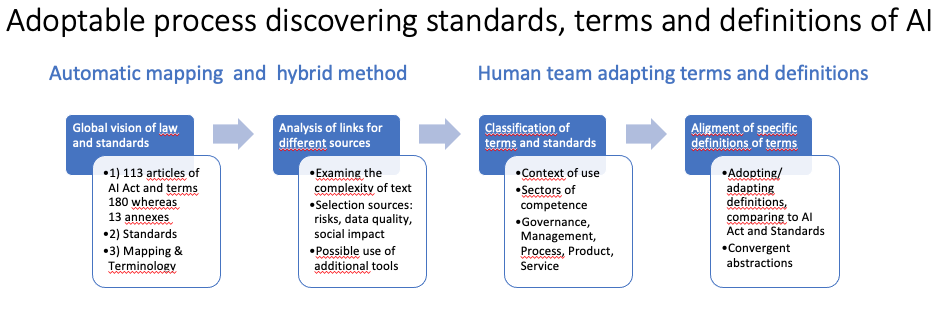
Following the legislative principles of the EU AI Act, it is also possible to apply its implicit capability of categorization of existing standards. When possible, standards can be connected to the articles of the AI Act, based on the commonality of terms with syntactic accuracy used in both texts. The aim is to provide assistance for the semantic accuracy of terms and therefore to their definitions, correlating the meanings that terms assume between laws and standards. The connected standards can give practical and technical contributions to the applicability of aspects of legislative regulations.
The European Regulation AI Act sets out rules on artificial intelligence to promote the adoption of human-centric and trustworthy AI, while ensuring the protection of health, safety, fundamental rights, including democracy, environmental protection, and innovation.
Existing Standards developed for scientific purposes by standardization organizations, such as ISO, can help to support the application of the Union laws in terms of quality of processes, products, data and services.
In general, a single standard is not adequate to cover all requirements of an AI Act article and does not contain all the aspects needed for SR Standardization Requests. The integrations of AI Act and Standards are an opportunity to create harmonized legislative and technical documents to support the development and maintenance of AI systems.
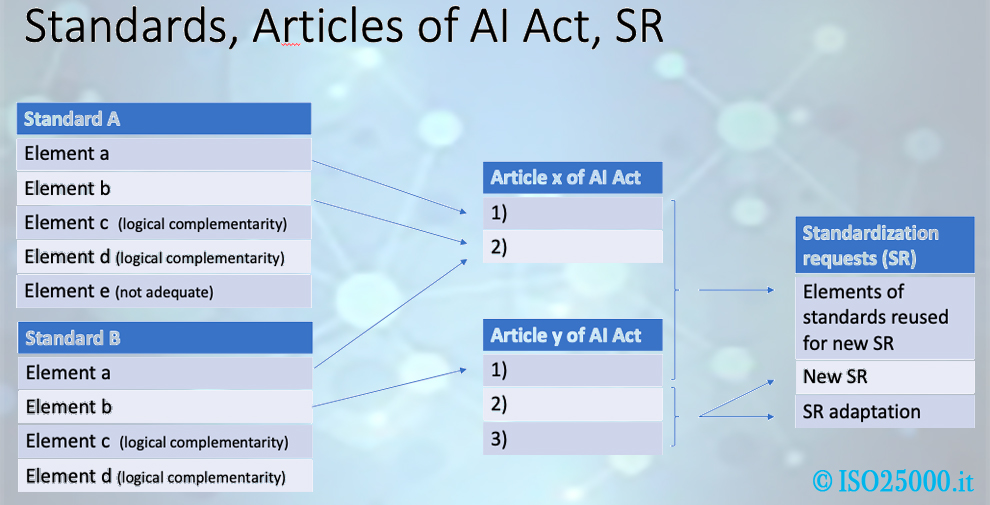
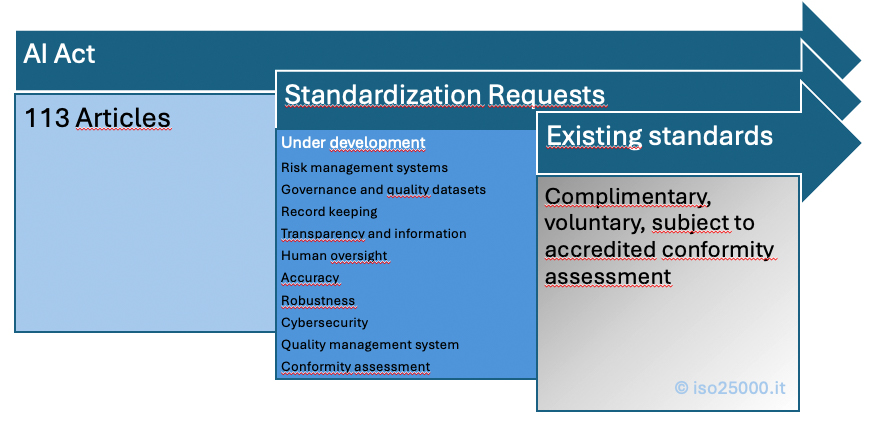
This work in progress aims to give a comparative view among the contents of the AI Act articles and the standards, possibly facilitating the considerations for new proposals concerning harmonized EN standards. Furthermore, the applied method helps to find an alignment of terminology.
It is understood that what is reported in the AI Act, including aspects of directly related standards, is mandatory, while what is complementary in specific additional contents of standards, is voluntary.
It is also useful to reduce the risk of difficult interpretation of terms to distinguish at the origin the standards that contain them among: governance, management, process, product or service domains.
Another critical issue is the specificity of the combinations and the complementarity of some qualitative characteristics considered. With these limitations and promoting new AI solutions, readers can have a structured overview of the situation and gain cognitive benefits in standardization, research, learning and teaching.
The prevalent occurrences of the terms are shown in the following graph
The data, as presented, have a research value and not an exclusively legal value.
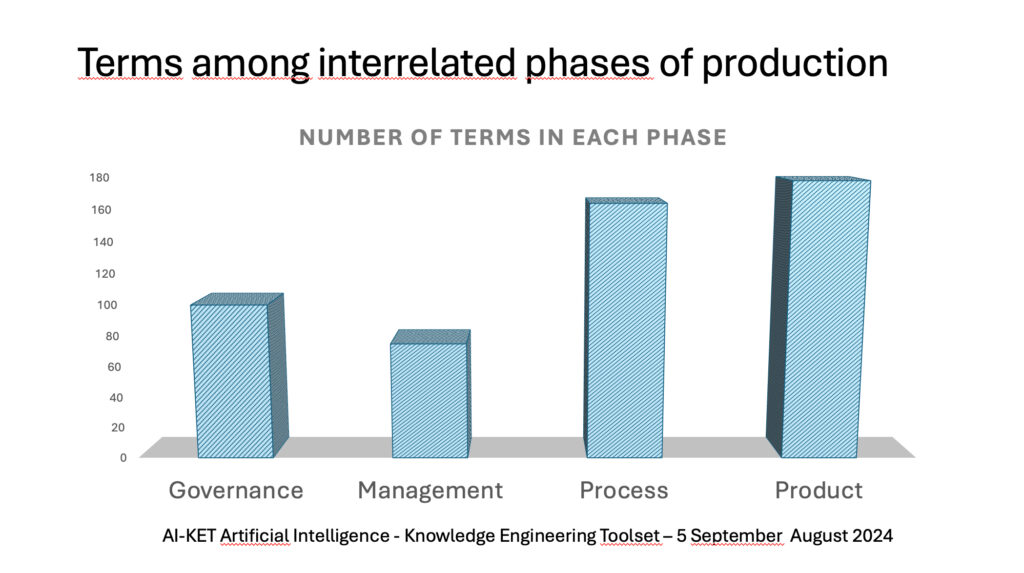
AI-KET Artificial Intelligence – Knowledge Engineering Toolset – 5 September August 2024.
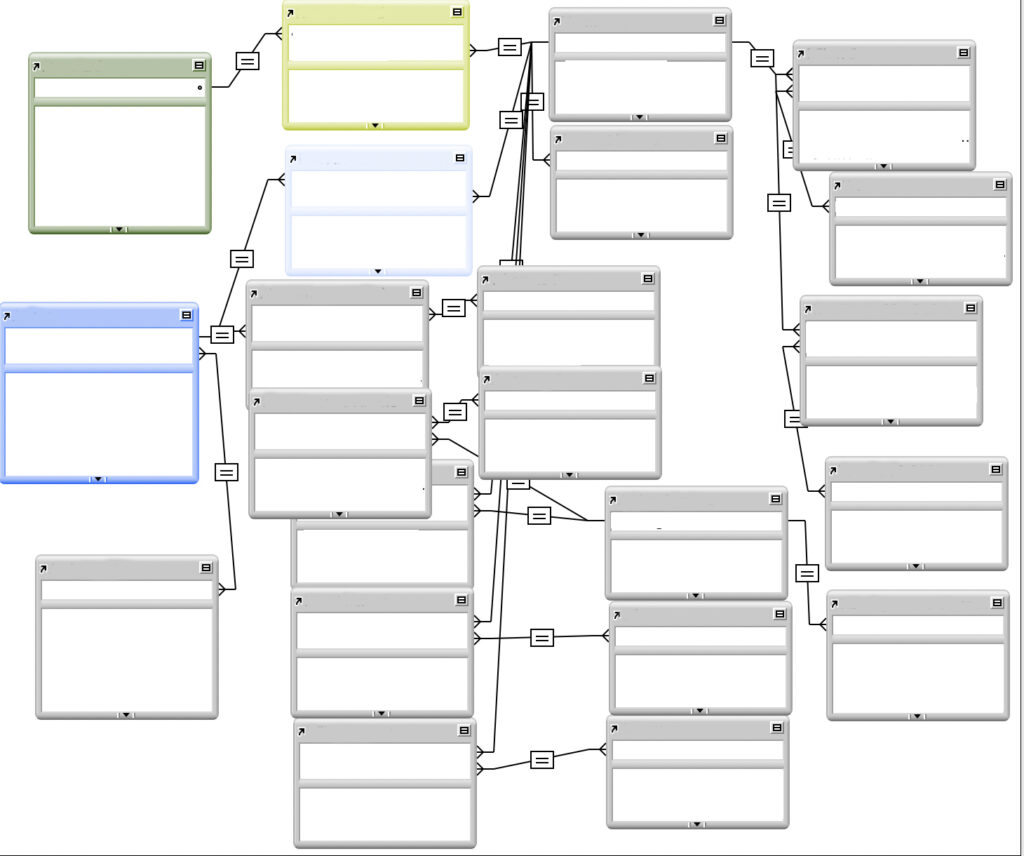
AI-KET Artificial Intelligence: Schema of the tool
UNI CT 533 volunteer Experts on Mapping
- Domenico NATALE: ISO SC7 Liaison Officer SC42, Member of Cen/Cenelec JTC21 AI, Chair of Task group UNI CT 533 on Mapping
- Antonio CAPPELLA: Innovation manager, Researcher, Web hosting and developing, AIOpenmind, SGI
- Valentina SAPUPPO: Legal and Technical expert, EDPB’s Support Pool of Experts, SGI
- Luigi BRIGUGLIO: Senior Researcher and ICT Consultant, CyberEthics Lab
- Nicola FABIANO: Member of United Nations University Artificial Intelligence Network (UNU AI Network)
- Alessandro STAZI: System documentation expert ISO SC7/WG2, SGI
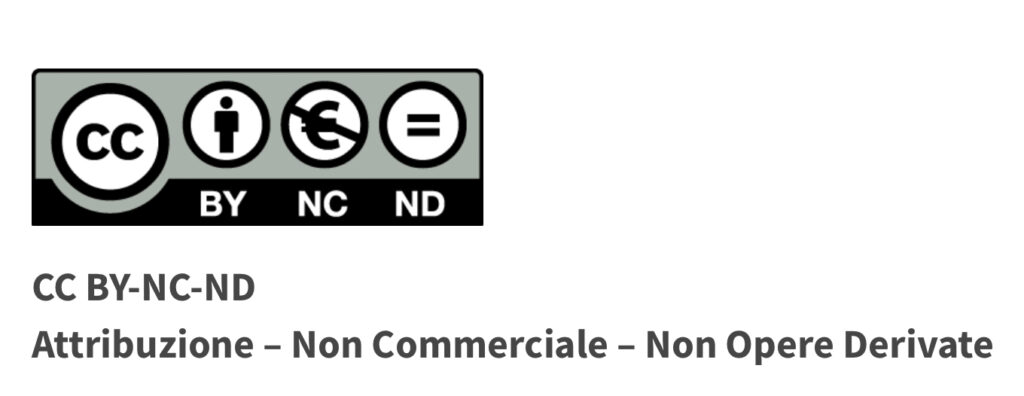
PRESS REVIEW on AI Act and Standards
- L’AI Act e l’eterna ricerca di nuovi standard (PDF)
— Ecomomy – Magazine – 5 December 2024 - AI ACT: THE DAYS AFTER…
— Diritto dell’Informazione – 26 November 2024 - Sistemi di IA affidabili e sicuri. Il ruolo della standardizzazione
— Mediaduemila – 5 November 2024 - Dall’AI Act a standard armonizzati in Europa per l’applicazione dell’intelligenza artificiale
— Ecomomy – 25 October 2024 - ISO/IEC 25000 – SQUARE
— ISO 25000 – 18 June 2024 - Intelligenza Artificiale Act: riflessioni sull’impatto per il Sistema-Paese nell’incontro a Tor Vergata
— Relazioni Internazionali di Tribuna Politica ed Economica – 26 February 2024 - AI Act e intelligence economica: gli impatti per il Sistema Paese
— Radio Activa – 23 February 2024 - DALLA TEORIA ALLA PRATICA: NECESSITÀ DI CRITERI E STANDARD PER L’APPLICABILITÀ DELL’AI
— Diritto dell’Informazione – 23 February 2024 - AI Act e Intelligence Economica
— Media Key – 23 February 2024 - ARTIFICIAL INTELLIGENCE ACT – Rischi e Vantaggi: Priorità Alla Governance Umana
— Il Giornale delle Belle Notizie – 23 February 2024 - Giovedì a Roma l’incontro ‘AI ACT e Intelligence Economica. Impatti e riflessioni strategiche per il Sistema-Paese’
— DiRE – 13 February 2024 - 15 febbraio: AI ACT e Intelligence Economica. Impatti per il Sistema-Paese
— PRIMA Online Agenda Febbraio – 13 February 2024 - A Roma e online ” AI Act e Intelligence Economica. Impatti e riflessioni per il Sistema-Paese”
— Sardegna Report – 13 February 2024 - «AI Act e Intelligence Economica. Impatti e riflessioni per il Sistema-Paese», incontro in presenza e on line
— Diocesi di Torino – 13 February 2024 - Intelligenza artificiale, quale impatto sul Sistema Paese?
— Città Nuova – 13 February 2024 - INNOVAZIONE. AI ACT E INTELLIGENCE ECONOMICA, IMPATTI E RIFLESSIONI PER IL SISTEMA-PAESE
— DiRE – 10 February 2024 - “AI ACT E INTELLIGENCE ECONOMICA. IMPATTI E RIFLESSIONI PER IL SISTEMA-PAESE”
— Diritto dell’Informazione – 9 February 2024 - AI Act e Intelligence Economica. Impatti e riflessioni per il Sistema-Paese
— Metronews – 7 February 2024 - A Roma e online ” AI Act e Intelligence Economica. Impatti e riflessioni per il Sistema-Paese”
— Informazione – 7 February 2024 - A Roma e online ” AI Act e Intelligence Economica. Impatti e riflessioni per il Sistema-Paese”
— Sardegna Report – 7 February 2024 - A Roma e online ” AI Act e Intelligence Economica. Impatti e riflessioni per il Sistema-Paese”
— Sardegna Report News – 7 February 2024 - AI Act e Intelligence Economica. Impatti e riflessioni per il Sistema-Paese 15 febbraio Roma
— Mediaduemila – 7 February 2024










